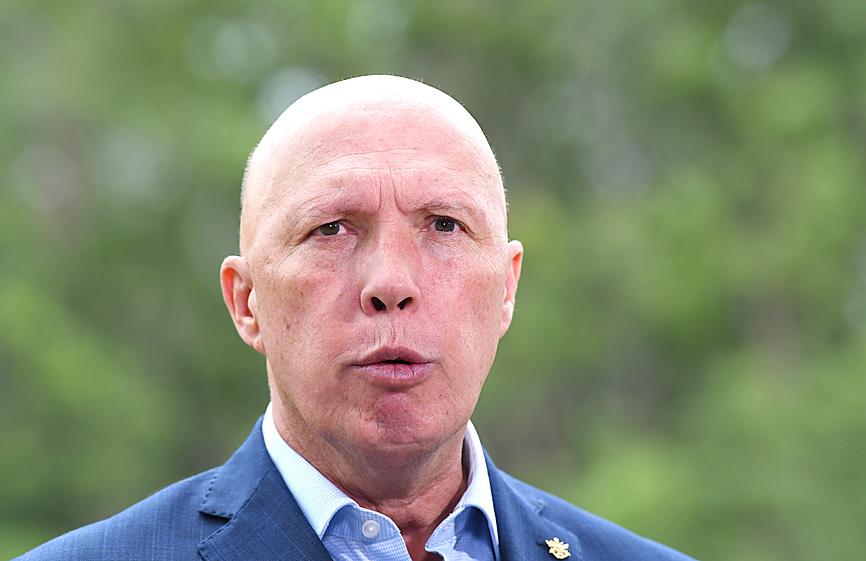The Australian government yesterday launched the Space Command, a new defense agency with echoes of the US’ Space Force that has been tasked with securing the country’s place in an “already contested” cosmos.
Australian Minister for Defence Peter Dutton said the new defense arm would be modest to start with, although he gave no detailed staffing or budget figures.
In a speech to the Australian Air Force, he said that space “will undoubtedly become a domain that takes on greater military significance in this century.”

Photo: EPA-EFE
“Space is becoming more congested and is already contested, particularly as the boundaries between competition and conflict become increasingly blurred through gray-zone activities,” he said.
Dutton positioned the Space Command as a clear counter to China and Russia’s extraterrestrial military ambitions, condemning the two nations in his speech, along with all “countries that see space as a territory for their taking, rather than one to be shared.”
The Space Command is to be led by Australian Air Vice Marshal Cath Roberts — “a self-professed science fiction buff” — who will oversee a team drawn from across the Australian military, as well as private contractors.
Dutton said that the agency would “initially be modest,” but added that Australia would need “a Space Force in the future” — a nod to the US service that was launched by then-US president Donald Trump in 2019.
The Space Command makes for close collaboration between the US and Australia in yet another domain, coming just months after the two countries signed a new military partnership, AUKUS, along with the UK.
The Australian government has been squarely focused on the military as an election looms, committing earlier this month to increase the country’s defense force to 80,000 troops by 2040.

A magnitude 5.6 earthquake struck off the coast of Yilan County at 12:37pm today, with clear shaking felt across much of northern Taiwan. There were no immediate reports of damage. The epicenter of the quake was 16.9km east-southeast of Yilan County Hall offshore at a depth of 66.8km, Central Weather Administration (CWA) data showed. The maximum intensity registered at a 4 in Yilan County’s Nanao Township (南澳) on Taiwan’s seven-tier scale. Other parts of Yilan, as well as certain areas of Hualien County, Taipei, New Taipei City, Taoyuan, Hsinchu County, Taichung and Miaoli County, recorded intensities of 3. Residents of Yilan County and Taipei received

TRUST: The KMT said it respected the US’ timing and considerations, and hoped it would continue to honor its commitments to helping Taiwan bolster its defenses and deterrence US President Donald Trump is delaying a multibillion-dollar arms sale to Taiwan to ensure his visit to Beijing is successful, a New York Times report said. The weapons sales package has stalled in the US Department of State, the report said, citing US officials it did not identify. The White House has told agencies not to push forward ahead of Trump’s meeting with Chinese President Xi Jinping (習近平), it said. The two last month held a phone call to discuss trade and geopolitical flashpoints ahead of the summit. Xi raised the Taiwan issue and urged the US to handle arms sales to

Taiwan has secured another breakthrough in fruit exports, with jujubes, dragon fruit and lychees approved for shipment to the EU, the Ministry of Agriculture said yesterday. The Animal and Plant Health Inspection Agency on Thursday received formal notification of the approval from the EU, the ministry said, adding that the decision was expected to expand Taiwanese fruit producers’ access to high-end European markets. Taiwan exported 126 tonnes of lychees last year, valued at US$1.48 million, with Japan accounting for 102 tonnes. Other export destinations included New Zealand, Hong Kong, the US and Australia, ministry data showed. Jujube exports totaled 103 tonnes, valued at

BIG SPENDERS: Foreign investors bought the most Taiwan equities since 2005, signaling confidence that an AI boom would continue to benefit chipmakers Taiwan Semiconductor Manufacturing Co’s (TSMC, 台積電) market capitalization swelled to US$2 trillion for the first time following a 4.25 percent rally in its American depositary receipts (ADR) overnight, putting the world’s biggest contract chipmaker sixth on the list of the world’s biggest companies by market capitalization, just behind Amazon.com Inc. The site CompaniesMarketcap.com ranked TSMC ahead of Saudi Aramco and Meta Platforms Inc. The Taiwanese company’s ADRs on Tuesday surged to US$385.75 on the New York Stock Exchange, as strong demand for artificial intelligence (AI) applications led to chip supply constraints and boost revenue growth to record-breaking levels. Each TSMC ADR represents